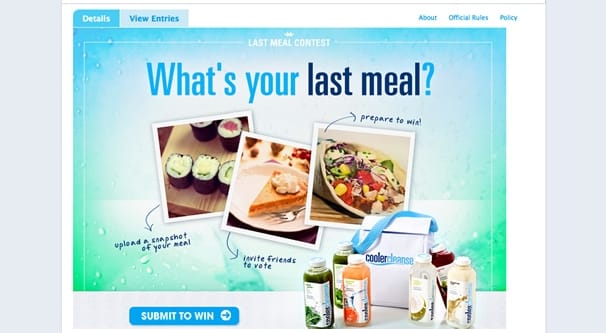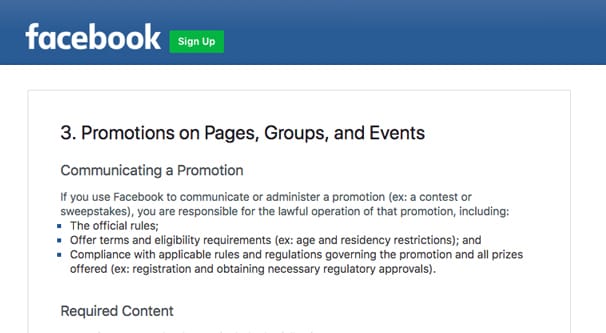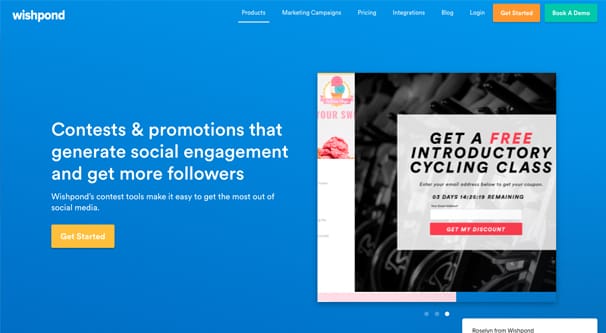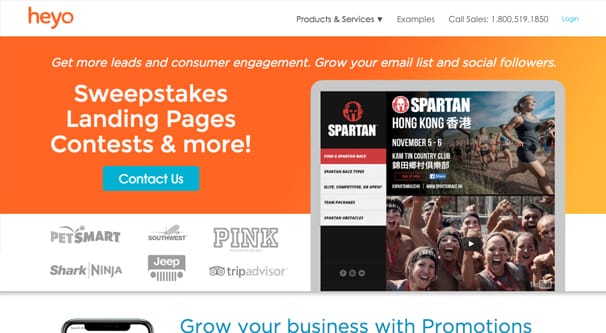 Written by ContentPowered.com
Written by ContentPowered.com
We’ve written before about Facebook contests and their role in a comprehensive marketing scheme. We’re no strangers to the topic. We’ve covered:
- Determining whether or not a contest is a good strategy for you.
- Coming up with what kind of contest you could run.
- Coming up with ideas of what kind of prizes you can offer.
Today, though, I need to talk about something we’ve mentioned in passing in those posts, but haven’t dug deep into: the Facebook rules.
Facebook knows that contests are a thing brands like to do from time to time, and as such, they have formulated a set of rules and regulations for what you can and can’t do with contests. Some of those rules stem from actual legal restrictions and laws governing lotteries and other giveaways. Some of them are protections to keep Facebook out of any legal hot water. Others are just rules to prevent brands from abusing Facebook’s mechanics to get reach or exposure they wouldn’t otherwise have.
Before we begin, though, I know you’re all prepared to point out counter-examples for most or all of the rules in this post. The fact is, with billions of users and millions of brands, Facebook can’t possibly police every single post made on their site. There are plenty of people who run contests that are against the Facebook terms of use. That doesn’t make it acceptable for you to run them too!
When another account breaks the rules and gets away with it, it tends to inspire a lot of copycats. Those copycats cause a surge in visibility for the rule-breaking format, and that’s what gets accounts banned or suspended. In fact, any time you’re choosing to run a contest and are knowingly or unknowingly violating a rule, you can get your account sanctioned in some way. It’s better to either hire someone who knows what they’re doing, or spend some time reviewing the various terms of use before setting up a contest of any sort.
Two Disclaimers
Before we dig into the rules, I have two disclaimers I need to make.
The first is the standard Facebook disclaimer. You are responsible for ensuring that you’re within the acceptable use of the platform, any apps you’re using, and any applicable laws. Neither I nor Facebook are in any way responsible if you break a rule and are punished for doing so.
The second is that this information, while accurate as of the time of writing, might not be accurate months or years down the line. Always check the Facebook help center and the relevant policies documents to make sure you’re aware of any changes Facebook has made in the intervening time.
That said, what I’ve written below is accurate as of the time of writing, since I’m referencing their policies directly. However, this in no way constitutes legal advice, and again, I’m not responsible if you break a rule.
A Policy Rundown
What I’m going to do here is give you a statement of Facebook’s policies that are relevant to contests and giveaways (or any other kind of promotion) and some interpretation to give you context. Ideally, you will have a fairly good grasp of what is and isn’t allowed by the time we’re done.
First of all, you can’t be misleading, fraudulent, or deceptive. If you’re running a contest and leading people to believe they’re going to win a car, you can’t then present them with a “toy yoda“. You also can’t pretend you’re representing a business you’re not, have ties to a business you don’t, or otherwise commit some kind of fraud or identity misrepresentation. Lies by omission count!
You are not allowed to promote or facilitate any kind of gambling. Facebook allows some casinos and gaming organizations to use their site for promotions, but such entities need prior written authorization. Encouraging people to use a slot machine on your site or otherwise gamble on games of skill or chance is a violation of their policies.
You cannot encourage users to inaccurately tag content. For example, I’ve seen people post a photo of their storefront and encourage users to tag themselves or their friends in the picture, even though none of them are actually pictured. This rule serves two purposes: it prevents you from encouraging user-generated spam when their friends receive notifications that they’ve been tagged in photos they aren’t in, and it helps prevent corruption of the Facebook facial-recognition algorithms. Since Facebook’s recognition engine runs on machine learning, false tagging feeds in a lot of inaccurate data it would then try to learn from. Obviously, Facebook doesn’t want this to happen.
You must not incentivize misuse of any Facebook features. You can’t encourage users to make fake accounts to follow a brand page, or spam inappropriate photos, or game any of the reach-based systems. In other words, no giving away prizes to people who break the rules.
If you’re going to run a contest or promotion, you must operate the promotion lawfully. This means you need an official rules document detailing the rules and regulations of the contest, the prizes, the tax burden if any, and any restrictions on eligibility. This includes any local or regional laws that restrict various types of giveaways. All of those “void in Rhode Island” statements aren’t just because people hate the state, you know. Rhode Island specifically has a requirement that you need to file to run a contest, and there’s a fine if you don’t. You can read more details on this kind of situation here.
Every Facebook contest or promotion of any kind must include a complete release of Facebook from any liability, and acknowledgement that Facebook does not sponsor, endorse, or otherwise promote or associate with the contest. You’re simply using Facebook as the platform that allows you to promote the contest, Facebook does not support your contest themselves. This is another legal disclaimer you need to include in your fine print, basically.
Facebook also requires that any promotion be administered by a Page, Group, Event, or App. You cannot use personal timelines or profiles to run a contest. Likewise, you cannot require a personal connection to be used as an entry method. You can’t require a share of a post to enter, you can’t have users tag people to enter, and so on.
Amid all of the recent privacy scandals involving Facebook and apps that use the platform, you have to make a few things clear about privacy as well. If you are collecting any form of data from users, even just their names, you must make it clear you – not Facebook – are the one collecting the data. That’s not all, though! You must obtain consent for data you collect, and you must secure that data responsibly. You are responsible for any leak of personal data or data breaches that result in user data being shared.
Regarding data collection, you cannot use automatic programs to scrape or harvest data. Facebook gives permission to a very select few spiders or scrapers, but like with casinos, you must obtain written permission first. You can bet that no normal company or business will be allowed to scrape data; that’s restricted to sites like Google using their indexing spiders.
General Types of Contests
Virtually every kind of contest or promotion you can run on Facebook will fall into one of three categories.
The first category is the sweepstakes or giveaway. These are promotions where one (or many) people win a prize based on randomness. There is no fee to enter, though you may require the user like a specific post, comment on a post, or otherwise interact with a page in a certain way in order to be confirmed for entry. You can also require that the winner be a follower of your page.
Sweepstakes are characterized by the randomness of the pick for the winner. Pulling a name out of a hat, running all of the entries through a random selection app, or otherwise choosing the winner randomly is essential. There is no judging of the entrants, only simple filtering to eliminate fake entries, bots, or other exploits that might be trying to game the process.
A sweepstakes is generally for one or a small handful of more valuable prizes awarded to one or a few individuals. Meanwhile, a giveaway is usually aimed at giving a larger number of smaller value prizes to more people. The difference would be between giving away one $5,000 gift card and 1,000 $5 gift cards.
The second category is the contest. A contest typically requires some kind of submission from a user, which is then judged by an individual or a team of judges once the entry period is over. Contests can take many forms.
The simplest form of a contest is something like a caption contest for a photo you post on your wall. It’s an easy submission process and an easy kind of contest to judge, though the low barrier to entry means that picking a winner might be a lengthy process.
Contests can have higher barriers to entry. You might have a photo submission contest where you then judge submissions and showcase the top posts. You might have a video submission contest. You might have a scavenger hunt with some kind of verification proof. There are all sorts of contests, but the key is to have some kind of active submission from the user, which is then judged to determine a winner. Contests don’t have a random selection, which is the important part.
The third category is the lottery. The simplest form of lottery would be selling tickets for $1 each, then drawing a random winner and giving them 90% of the accumulated pot. All sorts of lotteries exist around the world, but the crucial bit of information you need to know is that, in general, private lotteries are illegal. Some countries might allow them, but at least in the United States they are illegal to run. If the user has to pay for an entry, it’s generally a lottery and is not a valid promotion to run on Facebook.
Making It Easy
If you want to run a contest the easy way, there are several businesses out there that have apps you can use. They generally have simple forms you can fill out to customize a set of documents detailing the privacy policy, data harvesting disclaimers, rules and regulations, and whatever other official legalese you need to share. That takes a lot of the guesswork out of running a contest and lets you get on with what you really want to do.
Wishpond is one such company, with a selection of different social media promotion apps you can use. They have sweepstakes, photo contests, referral contests, caption contests, video submission contests, and a few other styles you can choose from. The caveat, of course, is that they charge you for use of their apps, with the cheapest plan starting at $50 per month.
Heyo is another platform you can use, with a wider variety of types of contest apps you can run, because they’re more of a builder than an app. You can drag and drop various elements you want to include in your contest app, to harvest different kinds of information for leads, or ask for different kinds of submissions. Their cheapest plan is $25 per month, but might be plenty depending on the number of entrants you expect to get.
Gleam is one of the more common contest apps in use, for a few reasons. One major reason is that they save basic user data so users who have entered Gleam contests before can enter other contests, run by other brands, using the same information with a single click. They also work across a wide variety of platforms and with a variety of different styles of promotion, though giveaways are the most common. Their individual apps are priced ranging from $10 to $30 per month.
Whichever you choose, make sure you have all of the associated documentation posted publicly and available if anyone wants to check.










